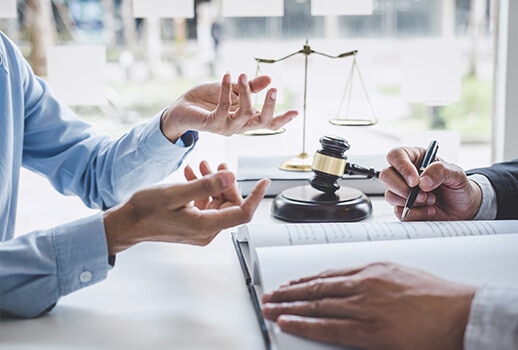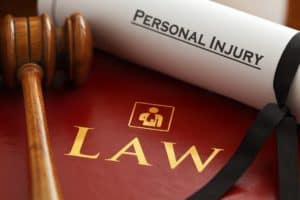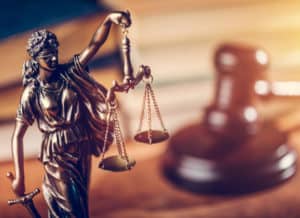We welcome you with a Servant’s Heart and a Warrior’s Spirit. Bienvenidos, Se Habla Espanol.

Disability Attorney
Words from the Founder:
I got hurt in the United States Marine Corps. However, at the time, I was not wise enough to get help with my injuries. I had one excuse after another. Almost ten years later, I finally got help. Meanwhile, my problem had gotten worse, and little did I know that I could have been getting medical support and a monthly check the whole time.
I was denied multiple times before finally getting service connected. I know the process and have learned how to do it. And getting denied is seemingly always part of the process post-separation. I wish I had found a disability attorney to get me help sooner.
My father (my uncle Joe who raised me) was paralyzed from his neck down. He was hurt two years before I was born in the United States Marine Corps. If he had not gotten his Veteran’s Compensation, he would not have been able to raise three kids, and we never wanted for anything. I did not know how my dad had money until I was much older. My Grand Mother was my mother figure, and she was on social security my whole life. So, without disability compensation, we would have been hungry.
Disability compensation is a benefit made to protect and shelter the most tender of our society. If a nation or person claims to be great, watch how they treat their most vulnerable, and then you will know the real story.
Whether It Is Veteran’s Compensation Or A Social Security Disability Claim, Let This Firm Be Your Champion And Fight For Your Family’s Honor.
I know what is at stake. We will get it done.
At the Ready.
JW Zepeda


No Consultation Fee, No Cost To You. We Do All The Work And Get Paid Only After We Get You The Help You Need.
IF WE DO NOT GET YOU HELP, WE DO NOT GET PAID.
This Firm Will Be Your Champion.
We Stand Ready To Fight For Your Family’s Honor.
We Will Get It Done.
Sometimes You Become Disabled Because of the Fault of Another and We Can Make Them Pay.
We Have A Determined Personal Injury Team.

These injuries are typically the result of Negligence.
Negligence: Negligence is a failure to act as a prudent person would under the circumstances that causes injury or death to someone owed a duty from the wrongdoer.
Elements: Things that the plaintiff (the person suing) must prove to have a chance at winning.
Negligence Elements:
1. Duty: A duty of care was owed the injured party:
General duty of care exists anytime someone is involved in any activity that may injure another.
The duty calls for a person engaging in a potentially harmful activity to act as a prudent person would under similar circumstances.
A prudent person would take necessary precautions to protect against foreseeable injuries to another.
Foreseeable means in the zone of danger. In other words, people who reasonably could be hurt by the activity.
The prudent person standard does not consider the wrongdoer’s characteristics to recuse them from liability except in some specific circumstances.
For Example:
The court will not hold a child to the same standard as an adult. A child’s standard of care is that of a child of like age, experience, and education, amongst other things.
A professional in their field will be held to the standard of care that other reasonable professionals would practice under similar circumstances.
2. Breach: A breach of the duty owed occurred:
Once the duty is established, the plaintiff must show that the wrongdoer (the tortfeasor) breached a duty.
Breaches of duty occur when the wrongdoer does not act as a prudent person would, to protect a foreseeable victim.
Res Ipsa Loquitur: This means the thing speaks for itself. Res Ipsa Loquitur may be enough to satisfy the breach and causation elements.
Res Ipsa has two elements.
1. The character of the accident is such that it would only usually occur with negligence.
2. The thing causing the harm is shown to have been under the management and control of the wrongdoer. The thing causing the damage does not have to be in sole control of the wrongdoer.
3. Causation: The breach was the cause of the harm:
Causation is broken into two categories. Often, these categories are thought of as separate elements; however, they combine to prove causation.
A. Actual Causation: There are multiple tests for causation.
But for: This is the most used test.
If you could take the wrongdoer’s action out of the situation and the harm would not have occurred, it is not the but-for cause.
Concurrent causes: When multiple acts by multiple wrongdoers combine to harm the victim, the but-for test is still used. The test shows that, but for the various breaches, the injury would not have occurred.
When concurrent causes are found, the multiple wrongdoers will be responsible for Damages if found liable.
Substantial factor test: This is used when many causes combine to cause the injury.
Actual causation is found here if the wrongdoer’s acts were a substantial factor in causing the harm.
Res Ipsa Loquitur: This means the thing speaks for itself. Res Ipsa Loquitur may be enough to satisfy the breach and causation elements.
Res Ipsa has two elements.
1. The character of the accident is such that it would only usually occur with negligence.
2. The thing causing the harm is shown to have been under the management and control of the wrongdoer. The thing causing the damage does not have to be in sole control of the wrongdoer.
B. Legal Causation: Proximate cause: This limits a wrongdoer’s liability to only foreseeable harm.
Intervening forces: These actions occur after the wrongdoer’s negligent act that further injures the victim. The wrongdoer is liable for intervening forces that are foreseeable. For Example:
After a car accident, you are thrown from your car, and your hand gets run over by another vehicle. If the person who caused the car accident is found negligent, they are also liable for your hand.
Super Intervening force: These acts further injure a victim after the wrongdoer’s negligent act. These acts are unforeseeable, so the original wrongdoer is not responsible for any injury caused by or after the super intervening forces. A super intervening force breaks the chain of causation. For Example:
After a car accident, you are thrown from your car, and your hand gets cut by a falling drone. Even if found negligent, the person who caused the car accident is not liable for your hand.
4. Damages: Damages that resulted from the breach:
The wrongdoer is responsible for all negligently caused Damages, even if the injuries were made worse due to a prior condition.
Egg Shell Skull Doctrine states that wrongdoers take their victims as the wrongdoer finds them.
For Example:
Suppose the injured person got dramatic injuries due to having a skull as sensitive as an eggshell. In that case, the wrongdoer is still responsible for the extent of all injuries.
Negligence per se: Occurs when companies or people owe duties by operation of law (this means because the law says so).
Negligence per se has two elements:
The injury may have been a result of premise liability.
Premise liability: This is a negligence claim with a duty imposed on the owner or manager due to the classification of a particular person.
The classification is based on why or how a person is on the property.
Below are the legal duties demanded by owners or managers of real estate.
For licenses:
Licensees enter the property with the expressed or implied permission of the owner. Licensees are on the property for their benefit or business.
One example of a licensee is a social visitor.
Suppose the owner knows of any dangers or risks a licensee is likely to encounter. Examples of hazards are loose boards or holes in the ground.
In that case, the owner must warn the licensee or make the risks safe.
The owner also owes the general duty of reasonable care in all active operations.
For invitees:
Invitees are on the property for their benefit and the owner’s benefit. Invitees are present due to an express or implied invitation from the owner.
Invitees include people entering to participate in any activity invited, including the guest or workers of those invitees.
For example, A customer, a skilled laborer hired to do work, or somebody making deliveries.
Even those who would customarily enter the establishment, which is not there due to an invitation, are still considered invitees.
Customary entrants may include, for example, government workers or lien holders.
Invitees are due to the highest level of care.
Owners must warn or make safe ANY dangerous condition that the owner knew about or could have found with a reasonable inspection.
For Example, A store owner would have to warn or make a long-sitting puddle of water safe on a store floor.
The duty to make safe or warn may not apply to apparent risks or dangers.
The owner also has the general duty of reasonable care in all active operations.
For trespassers:
Trespassers are those who come onto the land of another without invitation.
Unknown trespassers: No duty is owed to a trespasser unknown to the owner.
Known “discovered” trespassers: An owner must warn or make safe any conditions made by humans known to the owner that may cause serious harm.
Attractive Nuisance: This law puts a duty on property owners to warn or make safe anything that may attract a child of tender age to be a trespasser.
If attracted to the property, the child trespasser will not be treated as a trespasser. The child had an open invitation to be on the property in the eyes of the law.
The duty owed an individual may change:
The duty owed to a particular individual may change as their classification changes.
In other words, from invitee to trespasser.
For Example: If a customer wanders into the back of a store, where they are not invited, they are now trespassers.
Negligence per se: Occurs when companies or people owe duties by operation of law (this means because the law says so).
Negligence per se has two elements.
1. A law that was meant to defend against the type of harm causing the injury and,
2. The injured person is a member of the protected class the statute is designed to protect.
Inadequate security
This claim is brought due to a breach of the above duties owed to licensees, invitees, or discovered trespassers.
Inadequate security exists when an owner or manager needs to take proper measures after they know or should have known about dangerous situations.
For Example: If you were assaulted, robbed, raped, or experienced any number of harms due to not being adequately secured by the owner or manager of the location, you might have a claim that requires justice.
Improper Security Claims involve more than not having security guards or bouncers.
Improper security may involve having an unreasonably unsafe environment that the owner should have warned of or made safe.
Even if the owner or manager took some protective measures, the owner or manager might be liable for inadequate protection or for not keeping the protective standards.
For Example: Having security lights or cameras that are broken.
Inadequate security can occur in most places that are open to the public.
The injury may have been a result of product liability.
There are three ways products liability cases arise in Texas:
1. Manufacturing defect:
These defects occur when an item is not made following the manufacturing process and is dangerous beyond the expectation of the ordinary consumer.
These defects are not usually restricted to a single item but may involve many pieces.
It is very likely that when we bring a manufacturing defect claim, we are bringing you the justice you deserve and saving others from pain and suffering.
Company recalls on specific batch pieces are likely because an attorney filed a claim for someone like you. By filing a legal dispute, companies become aware of defects hurting people.
2. Design defect:
The design is the defect.
So even if the product was made correctly, it is unsafe due to a poor design.
These defects are not restricted to a single item. They involve all pieces made following this design.
It is very likely that when we bring a design defect claim, we are bringing you the justice you deserve and saving others from pain and suffering.
When the entire product line is recalled, not just a certain number of pieces, it is likely due to a design defect.
3. Failure to warn of defects:
Even though there are no defects, some products may still be dangerous when misused or used correctly.
When companies know or should know that a product has dangers that are not obvious if appropriately used, they must warn of the hidden dangers.
If a company knows that the product may be dangerous if misused and improper use is foreseeable, companies must warn against such use and the dangers involved.
Failure to adequately warn leads to a failure to warn of the defect.
Some uses only became foreseeable to companies once the product entered the market. It is likely that when we bring a failure to warn claim, we bring you the justice you deserve and save others from pain and suffering.
For Example, Bowls are not all microwave-safe, so a warning against misuse is given.
It is said sunshine is the best disinfectant, which the law does. It shines the light on dangerous items, situations, and people.
Legal disputes are the primary way companies and individuals learn from their mistakes.
Legal disputes make the world safer for the next person while at the same time getting you the justice you deserve.
I assure you that this firm will take this type of claim personally because we treasure your justice, and we could save the next person from harm or death, or poverty.
Your Justice Awaits. This Firm Will Be Your Champion And Fight For Your Family’s Honor.
We Will Get It Done.

A San Antonio, Texas, Born and Based Law Firm
Online Services Available All Day – Everyday | Except Christmas |
1005 E. Henrietta Ave., Kingsville, Texas 78363 | Administrative Hub | Mailing Address | Walk-Ins Welcome
401 E. Sonterra Blvd., Ste. 375, San Antonio, Texas 78258 | Walk-ins By Appointment Only
Some Services Are Offered World-Wide
All Services Are Available Throughout The State Of Texas
844 7-JWZLAW = 1-844-759-9529– Primary Number
Local Texas Phone Numbers
210-802-75JW= 210-802-7559
325-274-75JW= 325-274-7559
361-600-15JW= 361-600-1559
830-255-75JW= 830-255-7559
737-295-25JW= 737-295-2559
956-594-81JW= 956-594-8159
IMPORTANT NOTICE: THE CONTENT OF THIS WEBSITE IS NOT LEGAL ADVICE. THE CONTENT ON THIS WEBSITE IS FOR INFORMATIONAL PURPOSES ONLY. Using this website does not mean an attorney-client relationship exists between you and this law firm. The law is not a one size fits all approach, and your case must be thoroughly discussed with a competent attorney. We stand ready to serve and welcome you to contact our office to discuss your needs.
© 2022 JW Zepeda Law Firm | A Professional Limited Liability Company | All Rights Reserved.